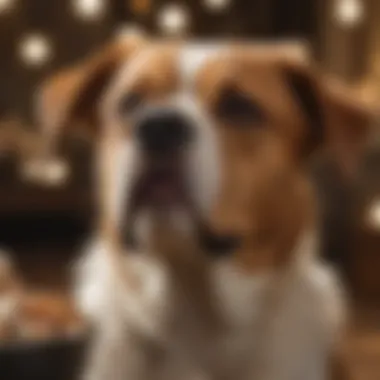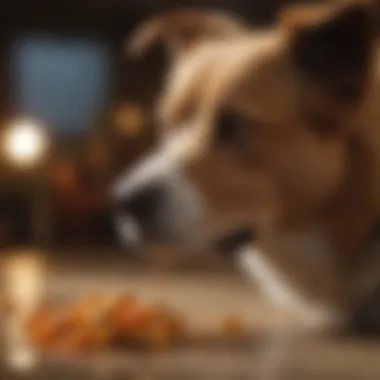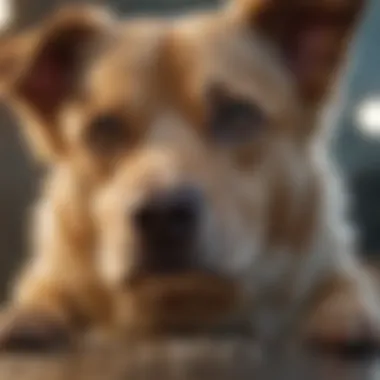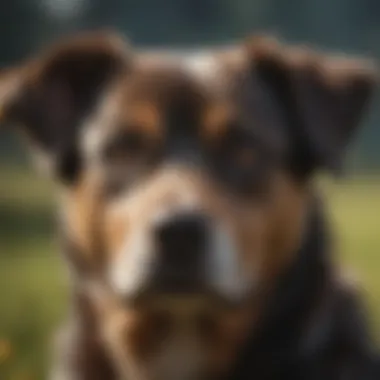Understanding Coprophagia in Dogs: Risks and Solutions


Intro
The topic of dogs consuming feces, known scientifically as coprophagia, can stir up quite a conversation among pet owners and veterinarians alike. While the act might seem utterly repugnant to us, for dogs, it can be more than just a strange habit. There’s often a deeper reason behind this behavior—be it nutritional deficiencies, instinctual drives, or even psychological factors. As a family pet or a working animal, understanding why dogs exhibit this peculiar behavior is crucial for their welfare and our peace of mind.
In this article, we will navigate through the various dimensions of coprophagia. We’ll address whether this behavior poses real harm to dogs, explore the underlying causes, and equip dog owners with practical strategies to manage and mitigate this issue. So, whether you’re a concerned pet parent, a veterinarian looking for deeper insights into canine behavior, or anyone interested in the quirks of our four-legged friends, you’re in the right place.
Behavioral Insights
Without diving headfirst into the ocean of information, let’s break things down into the core elements associated with this somewhat taboo behavior.
What Causes Coprophagia?
- Nutritional Deficiencies: Sometimes, dogs eat feces to compensate for lacking nutrients in their diet. Such deficiencies may stem from low-quality food that does not meet their dietary needs.
- Instinctual Behavior: In the wild, certain canines practice this behavior to keep their living environment clean and reduce the olfactory clues for predators. Even domestic dogs can follow this innate directive.
- Medical Issues: Certain conditions like parasites, diabetes, or pancreatitis might encourage a dog to consume feces due to the body's physiological responses.
- Stress and Anxiety: Dogs with anxiety may indulge in coprophagia as a coping mechanism. This behavior might emerge from situations when they feel neglected or overwhelmed.
Is It Harmful?
The question that lingers in many minds is simply, "Is this harmful?" The short answer is that it depends. While coprophagia might not always lead to immediate health issues, there are risks. Consuming feces can expose canines to parasites, bacteria, and viruses that could result in gastrointestinal upset or more serious diseases.
"The act itself might seem harmless, but the consequences can sometimes be severe, so understanding the roots is vital."
Understanding Dog Behavior
Before jumping to solutions, it’s essential to appreciate the context of dog behavior. Dogs are creatures of habit, and their tendencies can be shaped over time by training, environment, and social interactions.
Positive Reinforcement and Training
- Consistent Commands: Teaching commands like "leave it" can help redirect their attention from feces.
- Reward Systems: Rewarding a dog for ignoring feces or behaving in desirable ways can reinforce positive behavior.
- Supervision: Keeping an eye on your dog during walks or playtime can play a crucial role in managing this behavior.
Professional Guidance
In cases where coprophagia persists, it may be beneficial to consult with a veterinarian or a dog behaviorist. They can evaluate the dog's health and emotional state to tailor specific solutions.
In summary, understanding coprophagia in dogs is not just about identifying the behavior, but also about addressing the root causes and ensuring the overall well-being of these beloved furry companions. As we proceed through this article, we will delve deeper into this enigmatic issue.
Foreword to Coprophagia
When it comes to our furry companions, their behaviors often throw us a curveball. One such behavior that many dog owners find perplexing is coprophagia, or the act of eating feces. While it might make many cringe at first glance, understanding this behavior is crucial. Dogs might engage in coprophagia for numerous reasons, ranging from instinctual habits to potential health concerns. By delving into this unconventional eating habit, dog owners can better comprehend the underlying reasons and take appropriate actions if necessary.
Definition of Coprophagia
Coprophagia is technically defined as the intentional ingestion of feces. This behavior can be observed not just in dogs, but also in various other animal species. It is particularly noteworthy in canines, as it can stem from deeply ingrained instincts. Interestingly enough, this phenomenon isn't exclusive to just pet dogs. Stray dogs, for instance, may exhibit coprophagia as a means of survival, utilizing every available resource in their environment.
While it is a subject of much debate among pet owners, it's essential to recognize that for some dogs, coprophagia may not signal a serious problem. The reasons for such behavior can vary widely, from simple curiosity to deeper psychological or physical issues. Understanding and acknowledging these various facets is the first step in addressing your dog's sometimes baffling habit.
Prevalence in Dog Ownership
The prevalence of coprophagia among dogs is higher than most pet owners might think. Various studies and anecdotal evidence suggest that as many as 16% to 28% of dogs may partake in this behavior at some point in their lives. It's not merely confined to any specific breeds or ages; both younger pups and older dogs can exhibit this tendency. Family dogs, working breeds, and even purebreds have been reported to engage in this behavior.
The significance of understanding the prevalence cannot be overstated. Many owners may feel embarrassed or concerned if their dog is caught snacking on its droppings or perhaps on those of another animal. It's crucial to realize that this behavior is more common than one might assume, and many owners face similar challenges. Understanding the widespread nature of coprophagia can lead to a greater sense of camaraderie and shared experiences among dog owners, ultimately fostering a more knowledgeable and supportive community.
Why Do Dogs Eat Feces?


Understanding why dogs engage in coprophagia is pivotal for dog owners and caretakers alike. This behavior can be perplexing, even unsettling, causing concern among those who witness it. To untangle the motivations behind this act, we must take a closer look at several critical elements, from instinctual drives to nutritional and psychological considerations. By delving into these aspects, dog owners can better grasp their pet's behavior and take steps to manage it if necessary.
Instinctual Behavior
One major reason dogs might indulge in feces-eating is rooted in their instincts. Dogs are descendants of wolves, creatures that once relied on scavenging for survival. This instinctual behavior doesn’t just vanish with domestication; it sticks around. For many canines, especially young pups, it can appear as a part of their natural exploration. Just as toddlers may put anything within reach in their mouths, so too do puppies. They are exploring their world, often tasting everything they come across.
An interesting perspective is to view it through the lens of evolutionary survival tactics. In the wild, eating feces might have helped wolves derive additional nutrients or cover their tracks from predators. Some dogs will even consume their own feces as a means of keeping their living area tidy—an instinct tied to survival.
Nutritional Deficiencies
In some cases, dogs may eat feces due to underlying nutritional deficiencies. If a dog's diet is lacking in certain nutrients, they might instinctually seek out feces, thinking it might contain what they need. This can be especially true for aspects like fiber or protein. In their quest for nutrition, they may consume their own or other animals' waste in hopes of replenishing what’s missing in their diet.
It's crucial to assess your dog's daily diet. Is it balanced? Are you feeding them appropriate amounts based on their size, age, and activity level? Sometimes, cheap or low-quality dog food fails to deliver the necessary nutrients, prompting this unusual behavior. Consulting with a veterinary expert can help you build a tailored diet plan for your pet, ensuring their dietary needs are met.
Psychological Factors
Beyond instincts and nutrition, psychological factors can play a significant role in coprophagia. Stress and anxiety can lead dogs to engage in behaviors that comfort them, including the somewhat bizarre choice of eating feces. Just like humans might reach for snacks when feeling anxious, dogs might turn to this behavior as a coping mechanism. This may be particularly evident in dogs that experience separation anxiety or changes in their environment.
Attention-seeking behavior also often overlaps with psychological reasons. If a dog learns that eating feces garners significant attention—perhaps even a scolding—they might repeat the action simply to be noticed.
"Understanding the underlying reasons behind coprophagia aids in crafting effective strategies for managing it, nurturing both the dog's well-being and the owner's peace of mind."
Consequently, additional training and behavioral modification strategies may be essential to address not only the behavior itself but also the reasons behind it. Engaging with your dog through structured play or providing comfort during stressful situations can go a long way in preventing this behavior.
In sum, understanding the reasons dogs eat feces requires a multifaceted approach. Recognizing instinctual behavior, reviewing dietary deficiencies, and addressing psychological needs lays the groundwork for effectively managing coprophagia.
Health Risks Associated with Coprophagia
Understanding the health risks associated with coprophagia is pivotal for dog owners and veterinary professionals alike. While the behavior itself may appear innocuous, it carries the potential for a range of serious health concerns. Recognizing these risks can help owners take preventive measures, safeguard their pets, and when needed, seek appropriate veterinary intervention.
Transmission of Parasites
One of the foremost concerns with feces-eating is the risk of transmitting parasites. Dog feces can harbor numerous parasites including roundworms, hookworms, and giardia. When a dog ingests feces from another animal, it is directly exposed to these parasites. This can lead to various health issues, such as weight loss, abdominal pain, or lethargy, largely depending on the type and severity of the infection.
Preventative steps can include:
- Regular deworming schedules recommended by veterinarians.
- Keeping your dog's environment clean by promptly disposing of waste.
- Monitoring your dog’s poop for signs of parasites, such as a change in appearance or presence of mucus, and visiting a vet if anomalies are noticed.
The transmission of parasites is not only a concern for the individual dog but can also lead to outbreaks in group settings, such as kennels and dog parks, potentially affecting multiple pets.
Bacterial Infections
Eating feces can also expose dogs to harmful bacteria. These bacteria can originate from the feces of both dogs and other animals, and they include E. coli, Salmonella, and Campylobacter. If ingested, these bacteria can wreak havoc on a dog's digestive system, leading to symptoms such as vomiting, diarrhea, and severe discomfort.
Some precautionary measures include:
- Ensuring your dog is up to date on vaccinations, which can help mitigate some bacterial infections.
- Immediate removal of feces from the yard or living area.
- Observing your dog after potential fecal consumption for any behavioral changes or signs of illness.
As alarming as this sounds, many dogs can recover from these bacterial infections with prompt medical attention. However, in young puppies or older dogs, the effects can be more severe and require immediate care.
Gastrointestinal Issues
On top of parasites and bacteria, coprophagia can disrupt a dog's gastrointestinal health. Eating feces can lead to a variety of complications, including nausea, gastroenteritis, or pancreatitis. These issues can strain the dog’s digestive system, making it difficult for them to absorb nutrients effectively. As a result, dogs may face fluctuating energy levels, changes in appetite, or recurring bouts of vomiting or diarrhea.


To address gastrointestinal health concerns, dog owners can:
- Start a conversation with their vet regarding dietary adjustments. Sometimes a better quality diet can curb the urge to consume feces.
- Focus on providing plenty of fresh water to avoid dehydration due to gastrointestinal upset.
- Watch for stool consistency and any abnormal behavior to seek timely intervention.
It's crucial to consult with a veterinarian if any signs of distress or illness arise post-coprophagia. Early detection can save a dog from serious health complications.
Understanding the potential health risks associated with coprophagia is key for responsible dog ownership. With vigilance and intervention, most concerning aspects can be managed, ensuring a happy and healthy life for our four-legged companions.
Behavioral Implications
Understanding the behavioral aspects of coprophagia in dogs is vital for dog owners and pet professionals alike. This section sheds light on the reasons why dogs might engage in this behavior, diving into emotional triggers, social aspects, and comparative considerations across species. A thoughtful analysis may help in framing effective management strategies, promoting not only better health for the dog but also harmony in the household environment.
Connection to Stress and Anxiety
Stress and anxiety are significant factors that can lead a dog to start eating feces. Just imagine a nervous pup; their response to distress might be to seek comfort in food, even if it’s less than appetizing. Certain events—like changes in the household routine, moving to a new home, or the introduction of a new family member—can create feelings of unease in dogs. This emotional upheaval may trigger coprophagia as a coping mechanism.
Dogs who experience isolation or insufficient interaction with their owners can also become more anxious, leading them to engage in behaviors that garner attention, whether positive or negative. It is essential for dog owners to recognize the signs of stress, such as excessive barking, pacing, or hiding.
In managing this connection, an owner might consider incorporating strategies that reduce anxiety, including:
- Providing regular exercise to burn off excess energy that feeds anxiety.
- Creating a secure environment, perhaps with safe spaces where the dog can retreat when feeling overwhelmed.
- Using calming aids like sprays, pheromone diffusers, or even anxiety wraps.
"Understanding the emotional landscape of your dog is key in mitigating unwanted behaviors like coprophagia."
Role of Attention-Seeking Behavior
Dogs are remarkably social creatures, and their behavioral patterns can be heavily influenced by their desire for interaction. If a dog realizes that eating feces garners attention—be it from laughter, verbal scolding, or even surprise—it might persist with the behavior, viewing it as a successful strategy to connect with its owner.
To combat this behavior, owners should focus on:
- Redirecting attention to more acceptable forms of play or interaction.
- Reinforcing positive behavior; rewarding the dog for ignoring feces and focusing on their owner instead.
- Training techniques, such as ‘leave it’ commands that discourage the dog from engaging with feces.
Such tactics not only help lessen the occurrence of coprophagia but also foster a stronger bond between dog and owner.
Comparison with Other Animals
When looking at coprophagia, one can draw interesting comparisons to other animals. For instance, rabbits are known for their unique digestive process which involves consuming their feces to extract additional nutrients. This behavior, although entirely instinctual in rabbits, portrays the practicality of resource use in the animal kingdom.
In contrast, when it comes to dogs, coprophagia is less a biological necessity and more a behavioral anomaly that necessitates understanding. Other carnivorous animals may exhibit similar tendencies, such as hyenas, who may eat feces for survival or scavenging purposes. However, dogs often indulge more out of behavioral impulses stemming from stress, dietary deficiencies, or attention-seeking rather than nutritional needs.
By examining and understanding these differences, dog owners can better navigate their pet’s behaviors and adjust their responses accordingly, leading to healthier habits.
The exploration of these behavioral implications adds depth to the understanding of coprophagia. By viewing it through the lenses of stress, social interaction, and comparative behavior, a more comprehensive approach can be developed to address this peculiar issue in our canine companions.
Managing Coprophagia in Dogs
Coprophagia, or the act of eating feces, can be disconcerting for dog owners. Addressing this behavior is paramount, as it encompasses not just the dog's health but also the owner's peace of mind. Managing coprophagia involves a blend of dietary adjustments, training techniques, and environmental modifications. This holistic approach helps tackle the problem at its roots, allowing dogs to maintain a healthy lifestyle and providing owners with effective strategies to deal with this issue. Here’s a closer look at each strategy.
Dietary Adjustments
Changing a dog's diet can often play a crucial role in reducing coprophagia. Dogs sometimes revert to this behavior due to insufficient nutrition or imbalanced meals. Ensuring that a dog gets a complete and nourishing diet may lessen the urge to feast on feces.


- High-Quality Dog Food: Opt for premium food that meets the dog's nutritional requirements. Look for labels that prioritize digestible proteins and essential nutrients like omega fatty acids, vitamins, and minerals.
- Supplementation: Adding specific supplements like digestive enzymes can enhance nutrient absorption, potentially warding off the notion that feces provides any missing elements.
- Regular Feeding Schedule: By keeping a consistent feeding routine, a dog might feel satisfied with their meals, diminishing the likelihood of scavenging for additional sources of nutrients.
It's a good idea to consult with a veterinarian before making any significant changes to your dog’s diet, as they can assess and ensure the dog's nutritional needs are met without causing further issues.
Training Techniques
Behavioral training gives owners a powerful tool to combat coprophagia. Positive reinforcement can effectively redirect a dog's focus and disrupt the cycle of feces engagement.
- Command Training: Teach essential commands like "leave it" or "come" to intervene when the dog shows interest in feces. Consistency is vital, so engaging with the dog and giving praise when they comply will establish new, positive behaviors.
- Socialization: Exposing the dog to various environments and situations can reduce anxiety-based behaviors. A well-socialized dog might feel less inclined to resort to coprophagia due to stress or discomfort in new settings.
- Redirecting Attention: When a dog heads toward feces, redirect their attention with toys or engaging activities rather than reprimanding the behavior. This method fosters positive associations and effectively distracts them from the problem.
Implementing these training techniques requires dedication and patience, but with time, most dogs can learn to resist the allure of feces.
Environmental Modifications
The dog's surroundings can significantly impact their behavior. Addressing their environment can discourage coprophagia effectively.
- Immediate Cleanup: One of the simplest solutions is to ensure that any feces are picked up immediately after the dog goes to relieve itself. This may sound like common sense, but it’s surprising how often owners overlook this aspect.
- Fenced Areas: If possible, keep the dog's play area secured and monitored to prevent them from coming into contact with feces from other animals. The less available feces there are, the fewer opportunities the dog has to indulge in coprophagia.
- Behavioral Signs Observation: Keeping watch for signs of stress or anxiety can provide insight. If certain triggers lead the dog to this behavior, modifying their environment can lessen these stressors.
It's important to remember that changing a dog's behavior isn't an overnight fix. Nonetheless, with a structured approach incorporating diet, training, and environmental adjustments, owners can effectively manage and reduce coprophagia in their dogs.
Veterinary Insights
When discussing coprophagia in dogs, it's essential to turn to veterinary insights. Understanding how a veterinarian views this behavior is crucial for dog owners seeking answers and solutions. Veterinary professionals offer a perspective grounded in both medical knowledge and practical experience. Their insights can help pinpoint underlying health issues that may not be immediately obvious to the average pet parent.
Veterinarians can dissect the problem from multiple angles, including physiological, dietary, and behavioral facets. Their involvement is not just beneficial; it is often necessary when a dog's habit of eating feces doesn't improve with home interventions. Furthermore, the connection between coprophagia and potential health risks cannot be overlooked. A vet assesses whether the behavior is a symptom of a more serious condition or is a misstep in diet, making their role invaluable.
In essence, seeking veterinary insights serves to ensure the well-being of the dog while also alleviating the owner's concerns.
When to Consult a Veterinarian
Consulting a veterinarian on the issue of coprophagia becomes critical under specific circumstances. Here are some key indicators:
- Persistent Behavior: If a dog continually engages in coprophagia despite diet modifications and training efforts, it may warrant a vet visit.
- Health Changes: Observable changes in behavior, like excessive thirst, weight loss, or changes in stool quality, signal to make that appointment. These could indicate underlying health issues such as parasites or digestive disorders.
- Compulsive Actions: If the behavior appears compulsive or linked to anxiety, a veterinary assessment can help rule out diabetes, thyroid problems, or other medical issues.
A quick consultation can help identify or rule out medical issues and put owners' minds at ease.
Potential Medical Treatments
Should a veterinarian determine that there are physiological or psychological aspects fueling the coprophagia, several treatment options may be considered:
- Dietary Supplements: If deficiencies are at play, vets may recommend specific supplements to address nutritional gaps.
- Anti-parasitic Medications: In cases where parasites are involved, appropriate medications can eliminate the problem, allowing healthier habits to develop.
- Anxiety Management: If stress is identified as a factor, vets may prescribe medication to help manage anxiety levels in the dog. Behavioral therapy in conjunction with medication may also be suggested, helping the dog to develop healthier coping mechanisms.
Ultimately, understanding when to seek veterinary advice and the possible treatment avenues can lead to healthier behavioral outcomes for dogs suffering from coprophagia.
Culmination
Wrapping our heads around the subject of coprophagia in dogs really brings us to a crossroads of understanding behavior and health. Many dog owners might feel shocked or perplexed when they discover their furry friend has taken a liking to feces. Recognizing that this behavior can range from instinctual drives to reactions influenced by nutritional gaps or even psychological stress is crucial. Each reason can shed light on the behavior, fostering a greater understanding of our canine companions.
Summary of Key Points
- Definition: Coprophagia, the act of eating feces, is seen more frequently in dogs than one might assume. It can be a perplexing habit with various underlying causes.
- Health Risks: The practice carries the potential for health risks, including the transmission of parasites, bacterial infections, and gastrointestinal issues.
- Behavioral Reasons: Dogs may eat feces due to instinct, lack of essential nutrients, or simply due to anxiety and stress. It's a wide-ranging behavior that doesn’t point to a singular issue.
- Management Strategies: Various management strategies exist, from dietary adjustments to training techniques and environmental modifications, helping tackle the dilemma effectively.
- Veterinary Guidance: Consulting a veterinarian is always smart. They provide valuable insights into when medical treatment may be necessary and identify underlying health concerns.
Final Thoughts for Dog Owners
For dog owners, it’s essential to understand that coprophagia isn't always a serious cause for concern, yet it should not be taken lightly. Being well-informed allows you to address any issues efficiently. Here are a few final takeaways:
- Monitor Your Dog: Keep an eye on your dog’s behavior. Note any changes and consult your vet if changes in diet or health arise.
- Educate Yourself: Knowledge about this behavior can guide your responses. Books, websites, or even local communities can offer guidance.
- Create a Safe Environment: Simple modifications in your pet's environment can lessen the chance of such behaviors taking root. Limiting access to feces when on walks or ensuring a clean yard goes a long way in preventing coprophagia.
- Be Patient: Changing this behavior can take time. Employing positive reinforcement and being consistent in training efforts increases the likelihood of success.
Ultimately, understanding the whys and hows of coprophagia prepares you to take proactive steps. It's all about fostering a better bond with your dog while ensuring a safe and healthy lifestyle for them.







